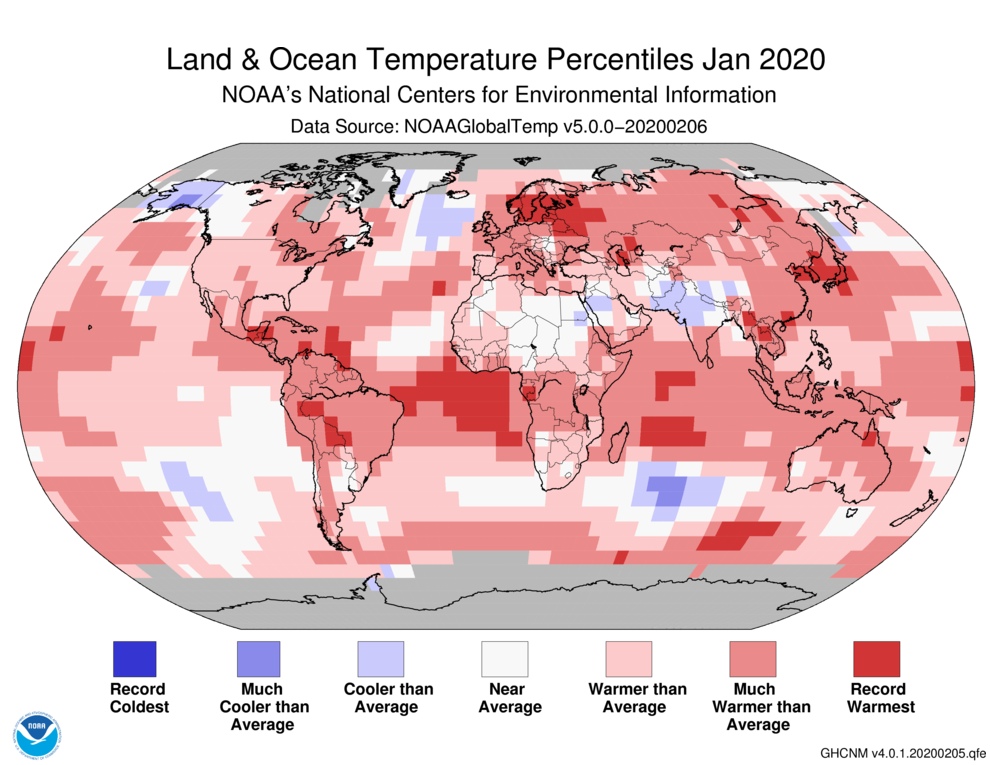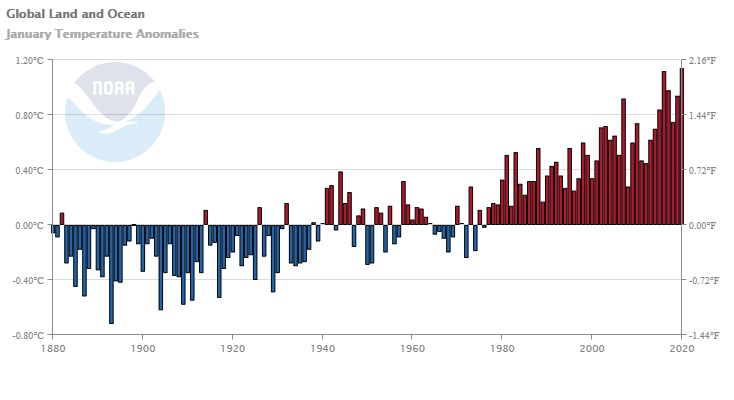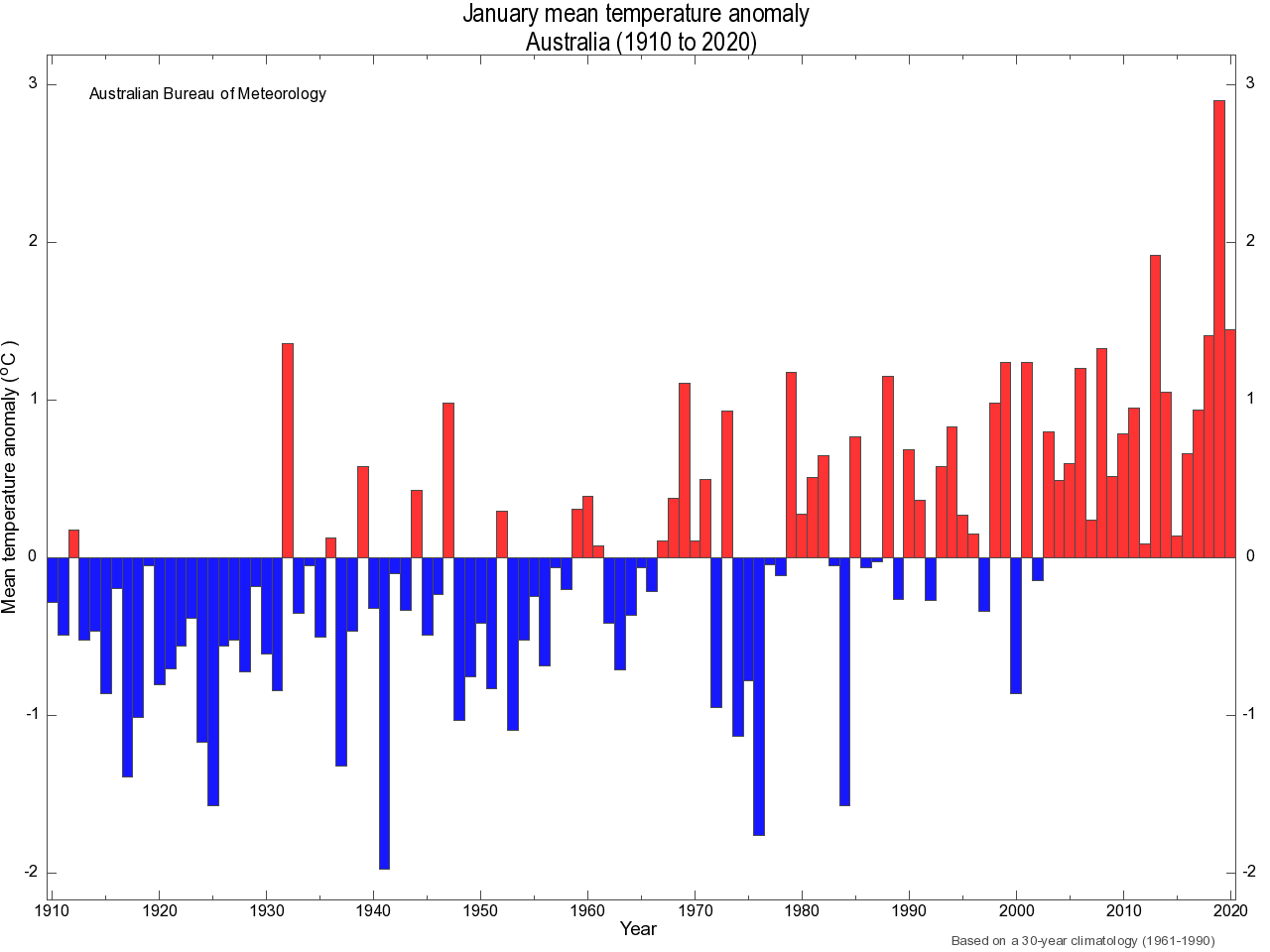New decade begins with significant records
A number of noteworthy temperture records were broken in the opening weeks of 2020.
-- Global warmth --
The first month of the 2020's was one of our planet's most abnormally warm months on record.
According to data released by the U.S. National Oceanic and Atmospheric Administration (NOAA), last month was Earth's warmest January in 141 years of records. This feat is based on the globally-averaged land and ocean surface temperature, which in January this year, was 1.14 degrees Celsius above the 20th century long-term average.

Image: Global land and ocean surface temperature percentiles during January 2020. Source: NOAA
This anomaly is the highest ever observed during the month of January, according to NOAA. It's also the fourth highest anomaly for any calendar month in 1681 months of records.
The only months that had higher global land-and-ocean temperature anomalies than January 2020 were March and February in 2016 and December in 2015. However, these three months occurred during one of the strongest El Nino events on record.

Image: Global land and ocean surface temperature anomalies during January. Source: NOAA
This is an important feature to point out, because El Nino events boost the average global temperature by releasing more heat into the atmosphere above the vast Pacific Ocean. Consequently, many of our planet's warmest months and years on record have occurred during El Nino.
Impressively, January 2020 was the warmest calendar month on record in the absence of El Nino.
-- Antarctica reaches new high --
In addition to record global warmth at the beginning of this decade, a number of unprecedented temperature observations may have also occurred in Antarctica during the last fortnight.
An Argentine research base located near the northern tip of the Antarctic Peninsula observed a temperature of 18.3 degrees Celsius on February 6th. If confirmed by the World Meteorological Organisation (WMO), this will be the highest temperature officially recorded anywhere on the Antarctic continent. The previous record was 17.5 degrees at the same location in 2015.
The WMO are also investigating reports that a temperature of 20.75 degrees Celsius was observed on February 9th at a monitoring station on Seymour Island, part of an island chain located near the Antarctic Peninsula. This would be the first time a temperature above 20 degrees has been officially observed in the Antarctic region (south of 60 degrees latitude), beating the old record of 19.8 degrees from Signy Island in 1982.
The WMO maintains separate records for temperatures observed on the Antarctic continent and those in the broader Antarctic region.
Both of these records are yet to be confirmed by the WMO and investigations are underway.
-- Australia off to a warm start --
While Australia escaped a record warm start to the decade, last month was still the country's third warmest January on record. In eastern Australia, Queensalnd and NSW registered their second and third warmest January on record, respectively. This followed Australia's warmest year on record in 2019.

Image: January mean tempeature anomalies in Australia. Source: Bureau of Meteorology
More locally, Penrith set a new benchmark for the highest temperature recorded in any Australian capital city region after hitting 48.9 degrees on January 4th. This is the closest any Australian capital city suburb has got to 50 degrees.
In data dating back to 1910, Australia's four warmest Januaries (based on mean temperature) have occurred since 2013, three of which were the last three years. Globally, the four warmest Januaries (combined land-ocean temperature) have all taken place since 2016, according to NOAA.